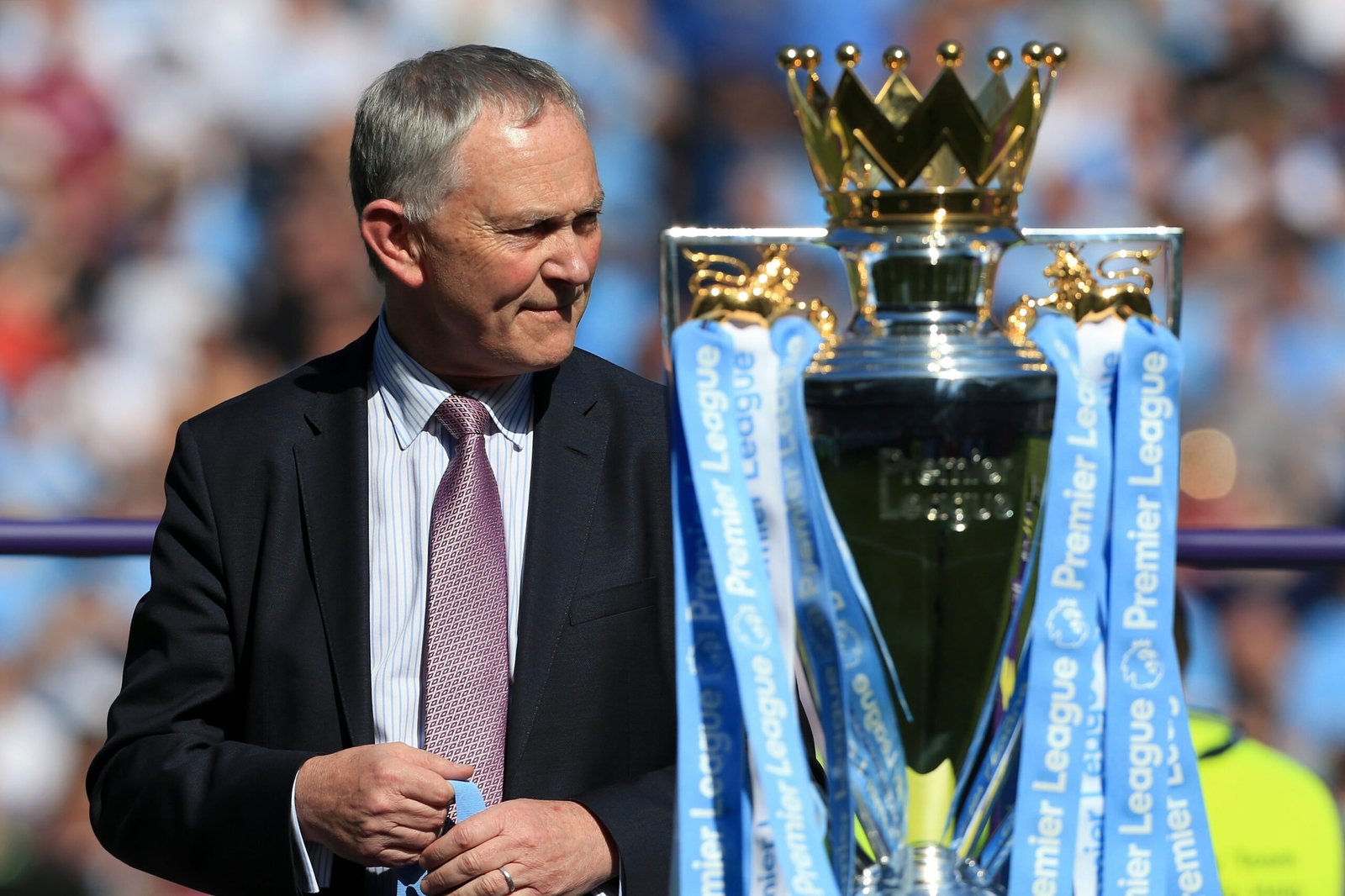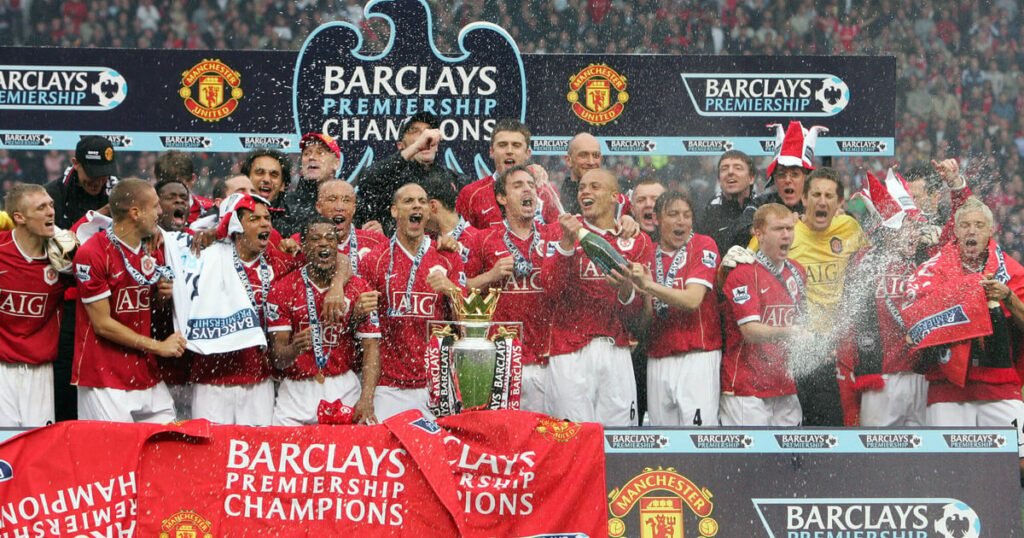There probably isn’t much that Sir Jim Ratcliffe, Rishi Sunak, Rebekah Vardy’s lawyer, Red Bull Formula 1 supremo Christian Horner, Roy Hodgson, Sheffield Wednesday football club, former England cricketer Monty Panesar and probably your dad all have in common.
But one thing that does link them all is seemingly not knowing the name of the top division in English football.
That division is, as you know, called the Premier League. But at one time or another over the past couple of years, the names mentioned above have been among the many to have referred to it as the Premiership.
In fairness, it’s not a name they have just plucked from the ether. It was called the Premiership for more than a decade but it hasn’t been since 2007 — 17 years ago. Yet the moniker still holds firm in the consciousness of a lot of people.
Ratcliffe has consistently referred to ‘the Premiership’ in basically every interview he’s given since buying into Manchester United at the start of this year. Sunak, the UK’s prime minister at the time, cited his favourite team Southampton “being promoted back to the Premiership” in May during a TV interview before Britain’s general election last month.
Vardy’s lawyer referred to the “Premiership” in a slightly laboured football analogy during the ‘Wagatha Christie’ trial. Hodgson, who managed in two Premiership seasons and 12 Premier League ones, nonetheless routinely called it the former, doing so as recently as January. Wednesday, of the second tier Championship, put half-time scores for ‘The Premiership’ on their big screen in August 2023 (though it was called that when they were last in it 24 years ago).
There are plenty of other examples.
It was referred to as the Premiership in an episode of British TV quiz show The Chase in 2023. When WAGMI United, the group of crypto and NFT speculators that bought Crawley Town of League Two the previous year, said it was going to take the team into the Premiership, it was pounced upon by people who were keen to prove the new owners knew nothing of English football. Only last week, the excellent Clinton Yates previewed the “Premiership” season in an ESPN podcast.
We could go on. It’s all over the place, and once it’s been pointed out, you can’t help but see it.
Is this a huge surprise? After all, it’s not a wildly different name, only a few letters difference, and people call things the wrong name all the time.
But it remains a fascination (to this writer at least), that the name ‘the Premiership’ had lodged into the consciousness of so many people so firmly, that they can’t shift it, despite a generation having passed since the division was renamed. Barcelona’s Euro 2024-winning winger Lamine Yamal has never been alive for a Premiership game, having been born in July 2007, a couple of months after the rebrand was announced.
To try to explain, we must first give a brief history lesson.
The company, the legal entity, has since its inception always been the Premier League — specifically, the Football Association Premier League Ltd. The division itself was called simply the FA Premier League in its first season, 1992-93. Then from 1993 to 2001, it was sponsored by a lager, Carling, and became known as the FA Carling Premiership.
Sir Alex Ferguson and Roy Keane lift the Carling Premiership trophy for Manchester United in 2001 (Alex Livesey /Allsport)
The initial renaming decision came about because of a sort of marketing technicality, when it came to arranging the Carling sponsorship deal. Those in charge didn’t want to sell the naming rights to the entity, because they had other sponsors who used the logo in their own marketing, and didn’t want to have to use the name ‘Carling’ too. Thus, they came up with something new — ‘The Premiership’, which was just the division, not the company. Bosses at Bass Breweries, which owned Carling at the time, were fans of the new name because, through the Stones Bitter brand, the firm was heavily involved in rugby league.
In 2001, Barclays bank took over the sponsorship and the division had a variety of identities: between then and 2004 it was the FA Barclaycard Premiership, then there was a shift in branding and from 2004 to 2007 it was the FA Barclays Premiership. In 2007 came the name change, so for the following nine years, it was known as the Barclays Premier League. Finally, in 2016 that sponsorship deal came to an end and was never replaced, and it is now simply the Premier League.
Confusing? Well, yes. And therein lies the reason that the Premiership was dropped in 2007: essentially, just to simplify things.
“Nobody ever got it right back then,” says Richard Scudamore, who was chief executive of the Premier League from 1999 to 2014. “It was all a mish-mash, it had all sorts of names and was all over the place.

Scudamore with the Premier League trophy in 2018 (Simon Stacpoole/Offside/Getty Images)
“In the end, I said, ‘This is completely crazy, we’re just going to go with Premier League’. Initially it was Barclays Premier League, then in 2016 it just went to Premier League.
“We tried to clear it up to achieve some sort of clarity and make it more succinct because ‘FA Barclaycard Premiership’ is a mouthful. We tried to narrow the number of words. That worked much better around the world.”
The official press release from 2007, announcing the change in name, said the “decision was taken after extensive research with fans and other stakeholders during the Premier League’s recent re-branding exercise showed the need for a single unified identity”.
When the Barclays deal lapsed, it seemed curious the Premier League didn’t seek a replacement title sponsor, but with international TV rights having become so crucial to its financial success, the theory was that a ‘clean’ brand name would be more valuable than whatever money a new sponsor would pay.
Nonetheless, changing the name of an extremely successful brand is no small thing. Considerable efforts were made to tell the public about the switch, from conventional advertising to making sure that TV and radio were on board.
“Oh yeah,” Scudamore says, when asked if the league would contact media outlets who got the name wrong.“We would have a quiet word with broadcasters all the time — presenters, commentators, co-commentators, pundits.
“We’d have a media launch day every year where we’d go through it, and we’d make a joke of it — ‘This is what we’re not, please don’t call us this anymore’. It was a thing, it was a real thing.
“We would call people out, even internally, round the table at meetings, round the office. It wasn’t like a disciplinary matter, almost like a gotcha — ‘Put a pound in the jar’.”
And yet, those efforts haven’t been entirely successful.
This isn’t a phenomenon limited to the Premier League. There are plenty of companies, brands or organisations that have changed names, but to many people, they will always be the old version.
In the UK, breakfast cereal Coco Pops tried to rebrand to Choco Krispies, which lasted a year before reverting to the old name. A similar thing happened to Britain’s Royal Mail postal service, which tried being Cosignia for a short time in the early 2000s. The arena that the Los Angeles Lakers play their basketball in will, to many, always be the Staples Center, despite it having been called the Crypto.com Arena since 2021. And most people will never actually call Elon Musk’s social media network X.
The Crypto.com Arena is still often referred to as the Staples Center, despite changing name in 2021 (Gary A. Vasquez-USA TODAY Sports)
This, as sports marketing consultant and founder of Added Time Club Simon Bristow explains, is often to do with when the brand entered our consciousness.
“If you asked a 17-year-old what it’s called, they would say ‘Well, it’s the Premier League, obviously’,” Bristow says. “It’s an era thing. I imagine Jim Ratcliffe’s strongest connection with the Premier League was during the Premiership era.
“It’s the same with fans — it’s people that recognise that era as their strongest memory of being a supporter: maybe it’s when they were going (to watch their team play) home and away, or were most invested in their club being part of ‘The Premiership’. It’s an inherent thing of them thinking of it as that name still, and they’ve never really taken on the change.”
Bristow thinks that because the word ‘Premiership’ still remains in the British sporting landscape, that will add (possibly subconscious) confusion too. The highest division of English rugby union is called the Premiership. So is Scottish football’s top tier.
“People will hear mention of ‘the Premiership’ — they might be listening to a radio bulletin and hear ‘…and in the Premiership today…’, but not really listen properly to the rest, so will think, ‘They’re talking about the football’. It stays in your consciousness.”
Does any of this really matter? Of course not: after all, to most of the general public, the name of the competition comes way down the list of things they care about. But it remains interesting that, even 17 years after the Premier League became the Premier League, to some it still is — and probably will always be — the Premiership.
“In the scheme of things that used to irritate you, it wasn’t in the top 10,” says Scudamore, of those who get it wrong. “In the overall seriousness of life, you can’t give it more importance than that.”
(Top photo: Manchester United celebrate their ‘Premiership’ success in 2007; Paul Ellis/AFP via Getty Image
Read the full article here

